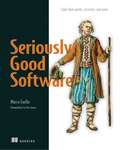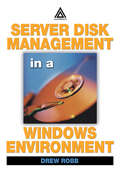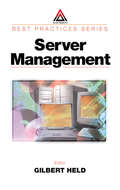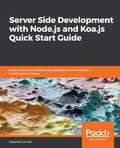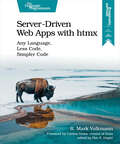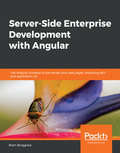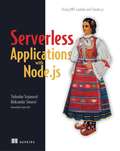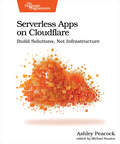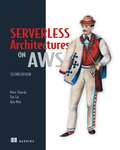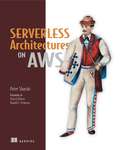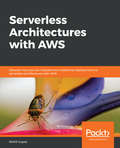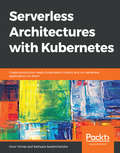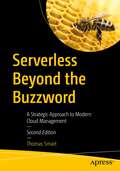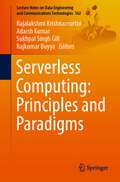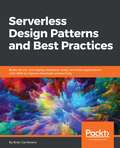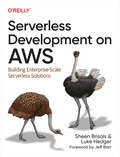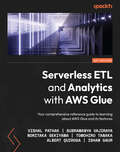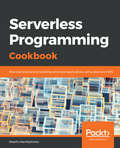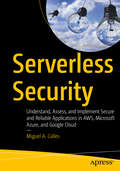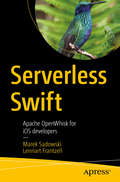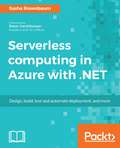- Table View
- List View
Seriously Good Software: Code that works, survives, and wins
by Marco FaellaSummary Serious developers know that code can always be improved. With each iteration, you make optimizations—small and large—that can have a huge impact on your application&’s speed, size, resilience, and maintainability. In Seriously Good Software: Code that Works, Survives, and Wins, author, teacher, and Java expert Marco Faella teaches you techniques for writing better code. You&’ll start with a simple application and follow it through seven careful refactorings, each designed to explore another dimension of quality. Purchase of the print book includes a free eBook in PDF, Kindle, and ePub formats from Manning Publications. About the technology Great code blends the skill of a programmer with the time-tested techniques and best practices embraced by the entire development community. Although each application has its own context and character, some dimensions of quality are always important. This book concentrates on seven pillars of seriously good software: speed, memory usage, reliability, readability, thread safety, generality, and elegance. The Java-based examples demonstrate techniques that apply to any OO language. About the book Seriously Good Software is a handbook for any professional developer serious about improving application quality. It explores fundamental dimensions of code quality by enhancing a simple implementation into a robust, professional-quality application. Questions, exercises, and Java-based examples ensure you&’ll get a firm grasp of the concepts as you go. When you finish the last version of the book&’s central project, you&’ll be able to confidently choose the right optimizations for your code. What's inside Evaluating software qualities Assessing trade-offs and interactions Fulfilling different objectives in a single task Java-based exercises you can apply in any OO language About the reader For developers with basic object-oriented programming skills and intermediate Java skills. About the author Marco Faella teaches advanced programming at a major Italian university. His published work includes peer-reviewed research articles, a Java certification manual, and a video course. Table of Contents *Part 1: Preliminaries * 1 Software qualities and a problem to solve 2 Reference implementation *Part 2: Software Qualities* 3 Need for speed: Time efficiency 4 Precious memory: Space efficiency 5 Self-conscious code: Reliability through monitoring 6 Lie to me: Reliability through testing 7 Coding aloud: Readability 8 Many cooks in the kitchen: Thread safety 9 Please recycle: Reusability
Server Disk Management in a Windows Environment
by Drew RobbHard drives and disk management receive scant attention from the industry press, yet recent surveys have identified disk failure as the #1 source of server downtime. Combine this fact with the skyrocketing TCO of data storage management, and it is apparent that server disk management is a subject deserving of much more scrutiny.Server Disk
Server Management (Best Practices)
by Gilbert HeldThis single-volume desktop reference provides comprehensive information on all server issues - featuring contributions from experts in the field. Engineers for system vendors, systems integrators, major resellers, end-users, and representatives from Hewlett-Packard, Novell, IBM, Compaq, Microsoft, and NEC share their ideas and experience on such to
Server Side development with Node.js and Koa.js Quick Start Guide: Build robust and scalable web applications with modern JavaScript techniques
by Olayinka OmoleBuild real-world robust web applications and APIs using the modern and expressive Koa Node.js framework.Key FeaturesGet up and running with Koa.js and leverage its power with node.jsGet the most out of Koa Async functions and generatorsCreate real time dynamic serverside apps efficiently with Koa.js Book DescriptionEvery developer wants to build modular and scalable web applications. Modern versions of JavaScript have made this possible in Node.js, and Koa is a Node.js framework that makes it easy. This book is the ideal introduction for JavaScript developers who want to create scalable server side applications using Node.js and Koa.js.The book shows you how Koa can be used to start projects from scratch, register custom and existing middleware, read requests, and send responses to users. We will explore the core concepts in Koa, such as error handling, logging, and request and response handling. We will dive into new concepts in JavaScript development, and see how paradigms such as async/await help with modern Node.js application development.By the end of this book, you will be building robust web applications in Koa using modern development paradigms and techniques of Node.js development.What you will learnCreate a simple server in Node.js and KoaWork with custom middleware in KoaHandle errors in KoaCreate routes, handle requests, and send responses from APIsBuild views and use templates in KoaAuthenticate your application and structure it properly in KoaWho this book is forThis book is for serverside developers and JavaScript developers who want to use Koa.js and Node.js to create fast and real time back end applications.
Server-Driven Web Apps with htmx
by R. Mark Volkmannhtmx is a library that adds logic and server interaction to HTML; you get the effect of using a front-end SPA framework without writing front-end code. Use any server-side programming language and framework to build server applications with endpoints that simply return snippets of HTML. Dynamically update portions of the current web page from HTTP responses. Add interactivity with JavaScript and libraries such Alpine and _hyperscript. Make your apps more secure by escaping user-supplied content and specifying a Content Security Policy. Go beyond basic HTTP requests with WebSockets and server-sent events. The htmx JavaScript library gives you a new way to craft web applications. The htmx approach differs significantly from that of the currently popular single-page application (SPA) frameworks; rather than write a bunch of JavaScript, you simply annotate HTML elements before you send them to the browser. The resulting code is easier to understand and modify, and because it downloads less to the browser and doesn't need JSON creation and parsing, you'll find it performs better, too. Rethink web application design; write code in any language that simply responds to requests with htmx snippets.Dynamically update portions of the current web page directly from the server.Implement common patterns such as lazy loading, input validation, CSS transitions, active search, optimistic updates, pagination, infinite scroll, polling, and click-to-edit.Add interactivity with JavaScript and libraries such as Alpine and _hyperscript.Use the htmx JavaScript API to simplify DOM operations.Make your web apps more secure: escape user-supplied content, use Subresource Integrity hashes, and enforce a Content Security Policy.Go beyond the basic HTTP request/response pattern with WebSockets and server-sent events.Discover a simpler way to implement web applications that emphasizes web fundamentals.What You Need:A modern web browser and the ability to build and run a local HTTP server using the server-side language and framework of your choice.The code examples are fully compatible with htmx 2.0.
Server-Side Development with Angular: Use Angular Universal to pre-render your web pages, improving SEO and application UX
by Bram BorggreveThis book is ideal for experienced front-end developers who are looking to quickly work through an intelligent example that demonstrates all the key features of server-side development with Angular. You'll need some prior exposure to Angular, as we skim over the basics and get straight to work.
Serverless Applications with Node.js: Using AWS Lambda and Claudia.js
by Slobodan Stojanovic Aleksandar SimovicSummaryServerless Applications with Node.js walks you through building serverless apps on AWS using JavaScript. Inside, you'll discover what Claudia.js brings to the table as you build and deploy a scalable event-based serverless application, based around a pizzeria that's fully integrated with AWS services, including Lambda and API Gateway. Each chapter is filled with exercises, examples, tips, and more to make sure you're ready to bring what you've learned into your own work.Foreword by Gojko Adzic.Purchase of the print book includes a free eBook in PDF, Kindle, and ePub formats from Manning Publications.About the TechnologyThe benefits of cloud-hosted serverless web apps are undeniable: lower complexity, quicker time to market, and easier scalability than traditional, server-dependent designs. And thanks to JavaScript support in AWS Lambda and powerful new serverless API tools like the Claudia.js library, you can build and deploy serverless apps end to end without learning a new language.About the BookServerless Applications with Node.js teaches you to design and build serverless web apps on AWS using JavaScript, Node, and Claudia.js. You'll master the basics of writing AWS Lambda functions, along with core serverless patterns like API Gateway. Along the way, you'll practice your new skills by building a working chatbot and a voice assistant with Amazon Alexa. You'll also discover techniques for migrating existing apps to a serverless platform.What's insideAuthentication and database storageAsynchronous functionsInteresting real-world examplesDeveloping serverless microservicesAbout the ReaderFor web developers comfortable with JavaScript and Node.js.About the AuthorSlobodan Stojanović and Aleksandar Simović are AWS Serverless Heroes and core contributors to the Claudia.js project. They are also coauthors of Desole, an open source serverless errortracking tool, and the lead developers of Claudia Bot Builder.Table of ContentsPART 1 - Serverless pizzeriaIntroduction to serverless with ClaudiaBuilding your first serverless APIAsynchronous work is easy, we Promise()Pizza delivery: Connecting an external serviceHouston, we have a problem!Level up your APIWorking with filesPART 2 - Let's talkWhen pizza is one message away: ChatbotsTyping... Async and delayed responsesJarvis, I mean Alexa, order me a pizzaPaying for pizzaMigrating to serverlessReal-world case studiesappendix A - Installation and configurationappendix B - Facebook Messenger, Twilio, and Alexa configurationappendix C - Stripe and MongoDB setupappendix D - The pizza recipe
Serverless Apps on Cloudflare
by Ashley PeacockUse serverless technologies to build applications that scale, more quickly and easily, and without worrying about deployment. Whether you're writing an API, a full-stack app, or real-time code, harness the power of serverless on Cloudflare's platform so you can focus on what you do best: delivering solutions. With hands-on instruction and code samples throughout, you'll go from building a simple API to analyzing images with AI. And, when it's time to launch, you'll learn how to deploy your applications and websites automatically, and how to optimize their performance for production. For decades, applications have been built and deployed in a similar way: you write code, provision a server, and upload your code. Over the years, you've graduated from FTP or SSH to Docker and Kubernetes, but fundamentally you've just switched from owning to renting; you're paying 24/7 for the server hosting your app. Serverless technologies change that model. With serverless, you focus on writing code, and not how it's deployed. You only pay for when your application code is executed, rather than paying for idle servers. In this book we'll use Cloudflare, which was built from the ground up to be a serverless platform, but the same concepts apply to every serverless provider. With this book, you'll learn a better way to build applications, and you'll see improved productivity and ease of deployment. From secrets to dependencies, such as databases and caches, Cloudflare has revolutionized how to build applications, and has made building applications easier and more fun. As you go through the book, you'll learn in detail what serverless is, how it functions behind the scenes, and how to build serverless applications on Cloudflare. When you finish this book, you'll understand how to think in terms of serverless functions, and you'll have the experience of deploying and extending these apps as you work through the examples. What You Need: Mac or PCGitHub account (free)Cloudflare account (free)
Serverless Architectures on AWS, Second Edition
by Yan Cui Peter Sbarski Ajay NairDesign low-maintenance systems using pre-built cloud services! Bring down costs, automate time-consuming ops tasks, and scale on demand.In Serverless Architectures on AWS, Second Edition you will learn: First steps with serverless computing The principles of serverless design Important patterns and architectures How successfully companies have implemented serverless Real-world architectures and their tradeoffs Serverless Architectures on AWS, Second Edition teaches you how to design serverless systems. You&’ll discover the principles behind serverless architectures, and explore real-world case studies where companies used serverless architectures for their products. You won&’t just master the technical essentials—the book contains extensive coverage of balancing tradeoffs and making essential technical decisions. This new edition has been fully updated with new chapters covering current best practice, example architectures, and full coverage of the latest changes to AWS. About the technology Maintaining server hardware and software can cost a lot of time and money. Unlike traditional data center infrastructure, serverless architectures offload core tasks like data storage and hardware management to pre-built cloud services. Better yet, you can combine your own custom AWS Lambda functions with other serverless services to create features that automatically start and scale on demand, reduce hosting cost, and simplify maintenance. About the book In Serverless Architectures with AWS, Second Edition you&’ll learn how to design serverless systems using Lambda and other services on the AWS platform. You&’ll explore event-driven computing and discover how others have used serverless designs successfully. This new edition offers real-world use cases and practical insights from several large-scale serverless systems. Chapters on innovative serverless design patterns and architectures will help you become a complete cloud professional. What's inside First steps with serverless computing The principles of serverless design Important patterns and architectures Real-world architectures and their tradeoffs About the reader For server-side and full-stack software developers. About the author Peter Sbarski is VP of Education and Research at A Cloud Guru. Yan Cui is an independent AWS consultant and educator. Ajay Nair is one of the founding members of the AWS Lambda team. Table of Contents PART 1 FIRST STEPS 1 Going serverless 2 First steps to serverless 3 Architectures and patterns PART 2 USE CASES 4 Yubl: Architecture highlights, lessons learned 5 A Cloud Guru: Architecture highlights, lessons learned 6 Yle: Architecture highlights, lessons learned PART 3 PRACTICUM 7 Building a scheduling service for ad hoc tasks 8 Architecting serverless parallel computing 9 Code Developer University PART 4 THE FUTURE 10 Blackbelt Lambda 11 Emerging practices
Serverless Architectures on AWS: With examples using AWS Lambda
by Peter Sbarski Sam KroonenburgSummaryServerless Architectures on AWS teaches you how to build, secure and manage serverless architectures that can power the most demanding web and mobile apps. Forewords by Patrick Debois (Founder of devopsdays) and Dr. Donald F. Ferguson (Columbia University).Purchase of the print book includes a free eBook in PDF, Kindle, and ePub formats from Manning Publications.About the TechnologyThere's a shift underway toward serverless cloud architectures. With the release of serverless computer technologies such as AWS Lambda, developers are now building entirely serverless platforms at scale. In these new architectures, traditional back-end servers are replaced with cloud functions acting as discrete single-purpose services. By composing and combining these serverless cloud functions together in a loose orchestration and adopting useful third-party services, developers can create powerful yet easy-to-understand applications.About the BookServerless Architectures on AWS teaches you how to build, secure, and manage serverless architectures that can power the most demanding web and mobile apps. You'll get going quickly with this book's ready-made real-world examples, code snippets, diagrams, and descriptions of architectures that can be readily applied. By the end, you'll be able to architect and build your own serverless applications on AWS.What's InsideFirst steps with serverless computingImportant patterns and architecturesWriting AWS Lambda functions and using the API GatewayComposing serverless applications using key services like Auth0 and FirebaseSecuring, deploying, and managing serverless architecturesAbout the ReaderThis book is for software developers interested in back end technologies. Experience with JavaScript (node.js) and AWS is useful but not required.About the AuthorDr. Peter Sbarski is a well-known AWS expert, VP of engineering at A Cloud Guru, and head of Serverlessconf.Table of ContentsPART 1 - FIRST STEPSGoing serverlessArchitectures and patternsBuilding a serverless applicationSetting up your cloudPART 2 - CORE IDEASAuthentication and authorizationLambda the orchestratorAPI GatewayPART 3 - GROWING YOUR ARCHITECTUREStorageDatabaseGoing the last mileAPPENDIXESServices for your serverless architectureInstallation and setupMore about authentication and authorizationLambda insiderModels and mapping
Serverless Architectures with AWS: Discover How You Can Migrate From Traditional Deployments To Serverless Architectures With Aws
by Mohit GuptaNo AWS experience is assumed but the book is targeted to technical professionals. Examples will be provided using Java or Node.js but AWS provides SDKs for other programming languages, including Python and .NET. These languages are supported by the AWS Lambda functions too.
Serverless Architectures with Kubernetes
by Onur Yılmaz Sathsara SarathchandraThis course is for software developers and DevOps engineers who have basic or intermediate knowledge about Kubernetes and want to learn how to create serverless applications that run on Kubernetes. Those who want to design and create serverless applications running on the cloud, or on-premise Kubernetes clusters will also find this course useful.
Serverless Beyond the Buzzword: A Strategic Approach to Modern Cloud Management
by Thomas SmartKnow how Serverless and cloud-native systems work, their benefits and roles in automating and optimizing organizations, and the challenges to be considered. Anyone interested in Serverless architecture will benefit from this book, regardless of their level of technical understanding. This revised and expanded new edition explains many related terms, such as microservices, cloud-native, architecture, several relevant AWS services, and how it all works together to produce cost-effective, scalable solutions in the cloud. The book starts at a high level and gradually gets more in-depth and technical.The less technical decision maker will learn how Serverless can affect finance, security, people, and compliance. The book touches on important decisions, such as selecting and working with external or internal specialists and teams; finding, evaluating, and training them; and the flexibility and dynamics available within digital projects. Deployment automation and DevOps also feature heavily in this book, and you will find real-world use cases and examples of Serverless architecture to get you started. It's worth noting that this book is not a development guide; it gives you a comprehensive understanding of what Serverless is so you can make informed decisions for your organization and projects. What You’ll Learn Understand Serverless architecture and strategyUnderstand modern cloud management strategy, governance, and organizational team structureHandle budget planning and managementGet started with Serverless architecture designGain knowledge of best practices and security, as well as data management and DevOpsStudy proactive logging, operations, architecture examples, case studies, and more Who This Book Is For Anyone interested in a deep understanding of Serverless and how it can impact organizations and projects, regardless of their technical level. Strategic insights are provided for entrepreneurs and executives, planning and team insights for project managers, and technical insights for architects and team leads. Cloud consultants working with enterprises can read everything for a full, in-depth understanding of the topic. Other readers, such as less technical CTOs/CIOs, VPs, entrepreneurs, product owners, project managers, etc., can get what they need from the first 5-7 chapters. More technical readers and those experienced with Serverless can skim through the first 3 chapters and start with the security deep dive in Chapter 4.
Serverless Computing: Principles and Paradigms (Lecture Notes on Data Engineering and Communications Technologies #162)
by Rajkumar Buyya Rajalakshmi Krishnamurthi Adarsh Kumar Sukhpal Singh GillThis book explores how advances in graphic processing units (GPUs), programmable logic devices (TPUs), and field-programmable gate arrays have altered the serverless computing landscape (FPGAs). Distributed system architectures and implementations have undergone significant changes due to the popularity of serverless computing. Making and releasing product applications, doing market research, and maintaining customer interactions might all benefit from the reduced infrastructure expenses made possible by serverless computing. This book is a great resource for teachers and students interested in learning more about serverless computing. Some of the main questions surrounding serverless technology, such as scalability and performance distribution, are answered. Concepts and fundamentals of computing performance such as cost-free operation, good time and resource management, fairness, and interoperability are discussed. Serverless is at the forefront of this shift, which has made data-intensive, distributed applications, and open-source platforms essential for any modern computer to function. Data-centric queuing, real-time logging and monitoring, querying, and alarms are all examples of serverless services.
Serverless Design Patterns and Best Practices: Build, secure, and deploy enterprise ready serverless applications with AWS to improve developer productivity
by Brian ZambranoGet started with designing your serverless application using optimum design patterns and industry standard practicesKey FeaturesLearn the details of popular software patterns and how they are applied to serverless applicationsUnderstand key concepts and components in serverless designsWalk away with a thorough understanding of architecting serverless applicationsBook DescriptionServerless applications handle many problems that developers face when running systems and servers. The serverless pay-per-invocation model can also result in drastic cost savings, contributing to its popularity. While it's simple to create a basic serverless application, it's critical to structure your software correctly to ensure it continues to succeed as it grows. Serverless Design Patterns and Best Practices presents patterns that can be adapted to run in a serverless environment. You will learn how to develop applications that are scalable, fault tolerant, and well-tested.The book begins with an introduction to the different design pattern categories available for serverless applications. You will learn the trade-offs between GraphQL and REST and how they fare regarding overall application design in a serverless ecosystem. The book will also show you how to migrate an existing API to a serverless backend using AWS API Gateway. You will learn how to build event-driven applications using queuing and streaming systems, such as AWS Simple Queuing Service (SQS) and AWS Kinesis. Patterns for data-intensive serverless application are also explained, including the lambda architecture and MapReduce.This book will equip you with the knowledge and skills you need to develop scalable and resilient serverless applications confidently.What you will learnComprehend the popular design patterns currently being used with serverless architecturesUnderstand the various design options and corresponding implementations for serverless web application APIsLearn multiple patterns for data-intensive serverless systems and pipelines, including MapReduce and Lambda ArchitectureLearn how to leverage hosted databases, queues, streams, storage services, and notification servicesUnderstand error handling and system monitoring in a serverless architecture a serverless architectureLearn how to set up a serverless application for continuous integration, continuous delivery, and continuous deploymentWho this book is forIf you're a software architect, engineer, or someone who wants to build serverless applications, which are non-trivial in complexity and scope, then this book is for you. Basic knowledge of programming and serverless computing concepts are assumed.
Serverless Development on AWS: Building Enterprise-Scale Serverless Solutions
by Sheen Brisals Luke HedgerThe adoption of serverless is on the rise, but until now, little guidance has been available for development teams that want to apply this technology on AWS. This definitive guide is packed with architectural, security, and data best practices and patterns for architects and engineers who want to build reliable enterprise-scale serverless solutions.Sheen Brisals, an AWS Serverless Hero, and Luke Hedger, an AWS Community Builder, outline the serverless adoption requirements for an enterprise, examine the development tools your team needs, and explain in depth the nuances of testing event-driven and distributed serverless services. You'll gain practical guidance for keeping up with change and learn how to build serverless solutions with sustainability in mind.Examine the serverless technology ecosystem and AWS services needed to develop serverless applicationsLearn the approach and preparation required for a successful serverless adoption in an enterpriseLearn serverless architectures and implementation patternsDesign, develop, and test distributed serverless microservices on AWS cloudApply security best practices while building serverless solutionsIdentify and adapt the implementation patterns for your particular use caseIncorporate the necessary measures for observable serverless applicationsImplement sustainable serverless applications in the cloud
Serverless ETL and Analytics with AWS Glue: Your comprehensive reference guide to learning about AWS Glue and its features
by Vishal Pathak Subramanya Vajiraya Noritaka Sekiyama Tomohiro Tanaka Albert QuirogaBuild efficient data lakes that can scale to virtually unlimited size using AWS GlueKey FeaturesLearn to work with AWS Glue to overcome typical implementation challenges in data lakesCreate and manage serverless ETL pipelines that can scale to manage big dataWritten by AWS Glue community members, this practical guide shows you how to implement AWS Glue in no timeBook DescriptionOrganizations these days have gravitated toward services such as AWS Glue that undertake undifferentiated heavy lifting and provide serverless Spark, enabling you to create and manage data lakes in a serverless fashion. This guide shows you how AWS Glue can be used to solve real-world problems along with helping you learn about data processing, data integration, and building data lakes.Beginning with AWS Glue basics, this book teaches you how to perform various aspects of data analysis such as ad hoc queries, data visualization, and real-time analysis using this service. It also provides a walk-through of CI/CD for AWS Glue and how to shift left on quality using automated regression tests. You'll find out how data security aspects such as access control, encryption, auditing, and networking are implemented, as well as getting to grips with useful techniques such as picking the right file format, compression, partitioning, and bucketing. As you advance, you'll discover AWS Glue features such as crawlers, Lake Formation, governed tables, lineage, DataBrew, Glue Studio, and custom connectors. The concluding chapters help you to understand various performance tuning, troubleshooting, and monitoring options.By the end of this AWS book, you'll be able to create, manage, troubleshoot, and deploy ETL pipelines using AWS Glue.What you will learnApply various AWS Glue features to manage and create data lakesUse Glue DataBrew and Glue Studio for data preparationOptimize data layout in cloud storage to accelerate analytics workloadsManage metadata including database, table, and schema definitionsSecure your data during access control, encryption, auditing, and networkingMonitor AWS Glue jobs to detect delays and loss of dataIntegrate Spark ML and SageMaker with AWS Glue to create machine learning modelsWho this book is forThis book is for ETL developers, data engineers, and data analysts who want to understand how AWS Glue can help you solve your business problems. Basic knowledge of AWS data services is assumed.
Serverless Integration Design Patterns with Azure: Build powerful cloud solutions that sustain next-generation products
by Abhishek Kumar Srinivasa MahendrakarA practical guide that helps you progress to using modern integration methods and leverage new cloud capability modelsKey FeaturesDesign critical hybrid integration solutions for your organizationGain in-depth knowledge of how to build cloud-native integration solutionsLeverage cognitive services to build smart cloud solutionsBook DescriptionWith more enterprises adapting cloud-based and API-based solutions, application integration has become more relevant and significant than ever before. Parallelly, Serverless Integration has gained popularity, as it helps agile organizations to build integration solutions quickly without having to worry about infrastructure costs. With Microsoft Azure’s serverless offerings, such as Logic Apps, Azure Functions, API Management, Azure Event Grid and Service Bus, organizations can build powerful, secure, and scalable integration solutions with ease.The primary objective of this book is to help you to understand various serverless offerings included within Azure Integration Services, taking you through the basics and industry practices and patterns. This book starts by explaining the concepts of services such as Azure Functions, Logic Apps, and Service Bus with hands-on examples and use cases. After getting to grips with the basics, you will be introduced to API Management and building B2B solutions using Logic Apps Enterprise Integration Pack.This book will help readers to understand building hybrid integration solutions and touches upon Microsoft Cognitive Services and leveraging them in modern integration solutions. Industry practices and patterns are brought to light at appropriate opportunities while explaining various concepts.What you will learnLearn about the design principles of Microsoft Azure Serverless IntegrationGet insights into Azure Functions, Logic Apps, Azure Event Grid and Service BusSecure and manage your integration endpoints using Azure API ManagementBuild advanced B2B solutions using Logic Apps, Enterprise Integration PackMonitor integration solutions using tools available on the marketDiscover design patterns for hybrid integrationWho this book is forServerless Integration Design Patterns with Azure is for you if you are a solution architect or integration professional aiming to build complex cloud solutions for your organization. Developers looking to build next-level hybrid or cloud solutions will also find this book useful. Prior programming knowledge is necessary.
Serverless Programming Cookbook: Practical Solutions To Building Serverless Applications Using Java And Aws
by Heartin KanikathottuThis book is for developers who would like to gain practical solutions to common problems while building their serverless application. Basic programming knowledgeis assumed.
Serverless Security: Understand, Assess, and Implement Secure and Reliable Applications in AWS, Microsoft Azure, and Google Cloud
by Miguel A. CallesApply the basics of security in serverless computing to new or existing projects. This hands-on guide provides practical examples and fundamentals. You will apply these fundamentals in all aspects of serverless computing: improving the code, securing the application, and protecting the infrastructure. You will come away having security knowledge that enables you to secure a project you are supporting and have technical conversations with cybersecurity personnel. At a time when there are many news stories on cybersecurity breaches, it is crucial to think about security in your applications. It is tempting to believe that having a third-party host the entire computing platform will increase security. This book shows you why cybersecurity is the responsibility of everyone working on the project. What You Will Learn Gain a deeper understanding of cybersecurity in serverless computingKnow how to use free and open source tools (such as the Node Package Manager, ESLint, and VSCode) to reduce vulnerabilities in your application codeAssess potential threats from event triggers in your serverless functionsUnderstand security best practices in serverless computingDevelop an agnostic security architecture while reducing risk from vendor-specific infrastructure Who This Book Is For Developers or security engineers looking to expand their current knowledge of traditional cybersecurity into serverless computing projects. Individuals just beginning in serverless computing and cybersecurity can apply the concepts in this book in their projects.
Serverless Single Page Apps: Fast, Scalable, and Available
by Ben RadyDon't waste your time building an application server. See how to build low-cost, low-maintenance, highly available, serverless single page web applications that scale into the millions of users at the click of a button. Quickly build reliable, well-tested single page apps that stay up and running 24/7 using Amazon Web Services. Avoid messing around with middle-tier infrastructure and get right to the web app your customers want.You don't need to manage your own servers to build powerful web applications. This book will show you how to create a single page app that runs entirely on web services, scales to millions of users, and costs less per day than a cup of coffee.Using a web browser, a prepared workspace, and your favorite editor, you'll build a complete single page web application, step by step. Learn the fundamental technologies behind modern single page apps, and use web standards to create lean web applications that can take advantage of the newest technologies. Deploy your application quickly using Amazon S3. Use Amazon Cognito to connect with providers like Google and Facebook to manage user identities. Read and write user data directly from the browser using DynamoDB, and build your own scalable custom microservices with Amazon Lambda.Whether you've never built a web application before or you're a seasoned web developer who's just looking for an alternative to complex server-side web frameworks, this book describes a simple approach to building serverless web applications that you can easily apply or adapt for your own projects.What You Need:To follow the tutorial in this book, you'll need a computer with a web browser. You'll also need a text editor and a git client. Building this web application will require some sort of development web server. You can use your own, or you can also use the one included with the tutorial's prepared workspace. The included web server requires Ruby 2.0, although we also suggest few alternatives. To get started quickly, you need a basic understanding of HTML, CSS, and JavaScript. If you're new to these topics, you can get up to speed using links we'll provide in the Introduction.
Serverless Swift: Apache OpenWhisk for iOS developers
by Marek Sadowski Lennart FrantzellDecrease development time to market with Serverless Swift—the event-based modern architecture for full stack developers. This book reviews how to use the Apache OpenWhisk framework to enrich your standalone applications with cloud-based functionalities from data sources up to Artificial Intelligence. You'll leverage serverless in your mobile apps with use case scenarios and gain the skills that will allow you to create robust, performant, secure yet economically viable systems in a cloud native environment. Finally, you'll see how to participate in the creation and further development of this open source project with Apache Foundation, which is supported by IBM, Google, and othersServerless has become a new style of coding, and it can be used to offload your mobile apps without incurring unnecessary costs. Get a solid, hands-on introduction into serverless, function-as-a-service, and cloud function technologies and learn why startups and enterprises are so excited about using them. What You'll LearnEmploy Apache OpenWhisk in your appsExpand your iOS skills with Cloud Native Serverless programmingUse a Docker container as a Polyglot actionWho This Book Is ForDevelopers, development leaders in the enterprise, and startup CTOs who want to learn a leading technology for the cloud in order to enrich applications with SaaS, Social Networks, and cloud based AI and APIs.
Serverless Web Applications with AWS Amplify: Build Full-Stack Serverless Applications Using Amazon Web Services
by Akshat Paul Mahesh HaldarLearn the fundamentals of serverless applications and how to take advantage of time-tested Amazon Web Services (AWS) to build scalable apps. This book shows you how to work with the key features of your applications with minimum code, simple CLI commands and one-click deployments. You'll see how to manage authentication, standard UI components, database storage, filesystem, CI/CD pipeline and more. You'll also examine the architecture, strengths, scalability, and limitations of serverless, and how to use AWS Amplify effectively. You will use tools including React, Cognito, GraphQL, DynamoDB, Kinesis, and Sagemaker. AWS Amplify is the fastest and easiest way to build serverless web and mobile apps at scale, comprising tools and services that work independently and can be wired together to build scalable apps. What You'll Learn Build GraphQL and REST APIsModel data with Amplify DatastoresSet up a CI/CD pipeline with AmplifyRecord and make sense of user data analytics with KinesisBoost your application with AI/ML capability using Sagemaker Who This Book Is ForDevelopers who have worked on web technologies and want to learn how to build serverless applications and developers interested in making powerful applications using AWS that can then be wired using AWS Amplify.
Serverless Web Applications with React and Firebase: Develop real-time applications for web and mobile platforms
by Harmeet Singh Mayur TannaBuild rich and collaborative applications using client-side code with React, Redux, and FirebaseKey Features1) A practical guide covering the full stack for web development with React 16 and Firebase2) Leverage the power of Firebase Cloud Storage, messaging, functions, OAuth, and database security to develop serverless web applications.3) Develop high-performance applications without the hassle of setting up complex web infrastructure.Book DescriptionReactJS is a wonderful framework for UI development. Firebase as a backend with React is a great choice as it is easy, powerful, and provides great developer experience. It removes a lot of boilerplate code from your app and allows you to focus on your app to get it out quickly to users. Firebase with React is also a good choice for Most Viable Product (MVP) development.This book provides more practical insights rather than just theoretical concepts and includes basic to advanced examples – from hello world to a real-time seat booking app and Helpdesk applicationThis book will cover the essentials of Firebase and React.js and will take you on a fast-paced journey through building real-time applications with Firebase features such as Cloud Storage, Cloud Function, Hosting and the Realtime Database. We will learn how to secure our application by using Firebase authentication and database security rules. We will leverage the power of Redux to organize data in the front-end, since Redux attempts to make state mutations predictable by imposing certain restrictions on how and when updates can happen. Towards the end of the book you will have improved your React skills by realizing the potential of Firebase to create real-time serverless web applications.What you will learnInstall powerful React.js and Firebase tools to make development much more efficientCreate React components with Firebase to save and retrieve the data in real-timeUse Firebase Authentication to make your React user interface secureDevelop React and Firebase applications with Redux integration Firebase database security rulesFirebase Cloud Storage Integration to upload and store data on the cloudCreate a complete real-time application with React and firebaseUsing Firebase Cloud messaging and Cloud functions with ReactFirebase Cloud Storage integration with ReactWho this book is forThis book is for JavaScript developers who have some previous knowledge of React and want to develop serverless, full-stack applications but without the hassle of setting up a complex infrastructure.
Serverless computing with Azure and .NET
by Sasha RosenbaumThis book is for .NET developers who would like to learn about serverless architecture. Basic C# programming knowledge is assumed.
